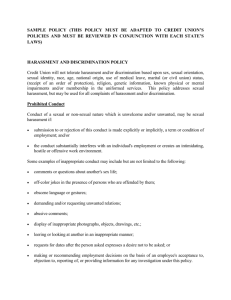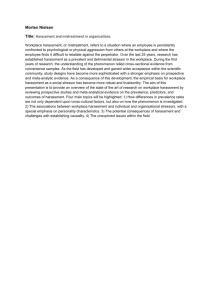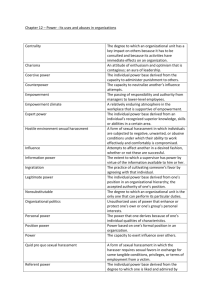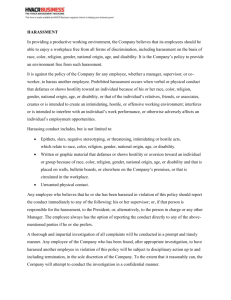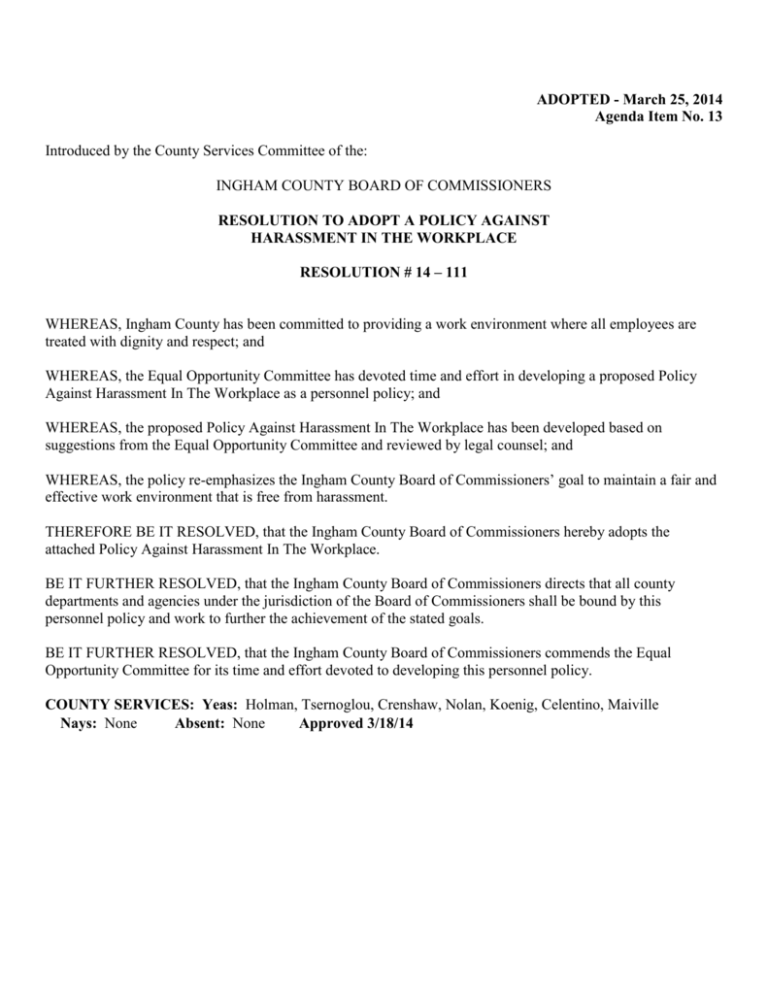
ADOPTED - March 25, 2014
Agenda Item No. 13
Introduced by the County Services Committee of the:
INGHAM COUNTY BOARD OF COMMISSIONERS
RESOLUTION TO ADOPT A POLICY AGAINST
HARASSMENT IN THE WORKPLACE
RESOLUTION # 14 – 111
WHEREAS, Ingham County has been committed to providing a work environment where all employees are
treated with dignity and respect; and
WHEREAS, the Equal Opportunity Committee has devoted time and effort in developing a proposed Policy
Against Harassment In The Workplace as a personnel policy; and
WHEREAS, the proposed Policy Against Harassment In The Workplace has been developed based on
suggestions from the Equal Opportunity Committee and reviewed by legal counsel; and
WHEREAS, the policy re-emphasizes the Ingham County Board of Commissioners’ goal to maintain a fair and
effective work environment that is free from harassment.
THEREFORE BE IT RESOLVED, that the Ingham County Board of Commissioners hereby adopts the
attached Policy Against Harassment In The Workplace.
BE IT FURTHER RESOLVED, that the Ingham County Board of Commissioners directs that all county
departments and agencies under the jurisdiction of the Board of Commissioners shall be bound by this
personnel policy and work to further the achievement of the stated goals.
BE IT FURTHER RESOLVED, that the Ingham County Board of Commissioners commends the Equal
Opportunity Committee for its time and effort devoted to developing this personnel policy.
COUNTY SERVICES: Yeas: Holman, Tsernoglou, Crenshaw, Nolan, Koenig, Celentino, Maiville
Nays: None
Absent: None
Approved 3/18/14
POLICY AGAINST HARASSMENT IN THE WORKPLACE
Ingham County is committed to providing a work environment where all employees are treated with
dignity and respect. Harassment in the workplace based upon race, creed, color, sex, age, national origin,
religion, marital status, height, weight, disability, sexual orientation, gender identity or any other protected
status will not be tolerated, whether committed by or directed toward co-workers, supervisors,
vendors/consultants, or those persons receiving services from the County. Harassment of others in the
workplace is destructive to a good working relationship and is counterproductive to the County's goal of
providing outstanding services to the public. Therefore, it is every employee's responsibility to insure that
Ingham County maintains a fair and effective work environment that is free from harassment. If you have
questions concerning this policy, please contact the Personnel Department.
A.
SEXUAL HARASSMENT DEFINED
Ingham County’s equal employment opportunity policy against discrimination
and harassment prohibited by law includes a prohibition against sexual harassment. The
law defines sexual harassment as unwelcome sexual advances, requests for sexual favors,
and other verbal or physical conduct or communication of a sexual nature when either:
1.
Submission to or rejection of such conduct or communication is made
explicitly or implicitly a term or a condition of an individual's
employment; OR
2.
Submission to or rejection of such conduct or communication by an
individual is used as a factor in employment decisions affecting the
individual; OR
3.
Such conduct or communication has the purpose or effect of substantially
interfering with an individual's employment or creating an intimidating,
hostile or offensive employment environment. This includes, but is not
limited to:
a.
Sexually-oriented jokes, gestures, noises, remarks or comments
about a person's sexuality or sexual experience directed at or made
in the presence of an employee;
b.
Sexual or discriminatory displays or publications; and
c.
Retaliation for sexual harassment complaints.
The foregoing policies require that each individual exhibit, in his or her conduct
and communications, sound judgment and respect for the feelings and sensibilities of
each employee. The prohibited conduct may be in the form of a sexual advance, but may
also be in the form of less direct verbal or non-verbal behavior. Behavior may be
unwelcome even if it is not intended or perceived as such by the person engaged in it.
The following are some examples of possible sexual harassment:
•
•
•
•
•
B.
Verbal sexual comments, innuendoes, slurs or jokes.
Non-verbal sexual gestures, leering or staring.
Visual displaying sexual pictures, writings, or objects.
Physically inappropriate touching, blocking someone's movement.
Threats or insinuating reprisal for refusing sexual demands or
conduct.
OTHER DISCRIMINATORY HARASSMENT
Other forms of harassment are also prohibited. Verbal or non-verbal conduct that
exhibits hostility or disrespect toward an individual or group because of race, religion,
national origin, color, gender, age, marital status, height, weight, disability, sexual
orientation, gender identity or any other protected classifications will not be tolerated. As
with sexual harassment, behavior of this kind may take a number of forms including, but
not limited to; oral or written communications, the display of printed or graphic material,
slurs, gestures, jokes and physical acts.
C.
WHAT YOU SHOULD DO IF YOU BELIEVE YOU HAVE BEEN HARASSED
You may, but are not required to, speak with the offending individual directly and
inform the offending individual that the behavior in question is unwelcome and must be
stopped.
It is the policy of Ingham County that any employee who in good faith believes he or she
has been subjected to illegal discrimination or harassment prohibited by law, or who
believes in good faith he or she has observed discrimination or harassment prohibited by
law, must report that fact immediately in writing to:
1.
Your Department Director/Elected Official; or
2.
If the individual does not feel comfortable with your Department
Director/Elected Official, the individual should feel free to bypass
such individual and file a written complaint with the Human
Resources Director.
If an employee has any questions regarding the reporting of such matters, they
should contact the Human Resources Director.
D.
WHAT YOU SHOULD DO IF YOU BELIEVE ANOTHER EMPLOYEE IS
BEING HARASSED
If you observe or have knowledge of an incident of harassment involving other
employees, you should immediately file a written complaint with your Department
Director/Elected Official or the Human Resources Director.
If you are a supervisor, you have a responsibility to maintain a work environment
that is free from unlawful harassment and must report, in writing, any observed or
reported incident of harassment involving other employees immediately to your
Department Director/Elected Official or the Human Resources Director.
E.
HOW COMPLAINTS OF HARASSMENT WILL BE HANDLED
Investigation- The County will promptly conduct a thorough and impartial
investigation of any complaint or report of harassment.
Confidentiality- To the extent possible, the County's investigation will be
conducted in a manner calculated to protect the privacy of the individuals involved, and
the confidentiality of the complainant. However, because an investigation may include
interviews of other employees or persons, absolute confidentiality is not always possible.
Disciplinary action- If the investigation reveals that harassment has occurred,
disciplinary action up to and including discharge will be taken. The nature of the
discipline will depend upon the circumstances of each case.
Again, all complaints and the actions taken to resolve such complaints will be
treated confidentially and will be disclosed only when necessary to the investigation and
a resolution of the matter. However, no employee is promised strict or absolute
confidentiality.
If an investigation of the complaint of harassment or unlawful discrimination
reveals that the complaint was not made in good faith or that an employee has provided
false information regarding the complaint, disciplinary action may be taken against the
individual who filed the complaint or who gave the false information.
F.
PROTECTION AGAINST RETALIATION
If a report of discrimination or harassment prohibited by law is made in good
faith, the County will protect the reporting individual from retaliation or any other
detrimental impact on his or her employment. Disciplinary action, up to and including
discharge, will be taken against anyone who attempts such retaliation. Employees who
become aware of complaints or investigations of harassment are expected to refrain from
unnecessary and unprofessional discussions with coworkers concerning the individuals
involved; as such discussions may themselves be a form of retaliation.


